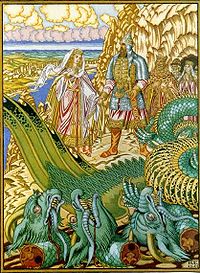- Dobrynya Nikitich
-
Dobrynya Nikitich (Russian: Добры́ня Ники́тич) is one of the most popular bogatyrs after Ilya Murometz from the Kievan Rus era. Many byliny center on Dobrynya completing tasks set him by the prince. Dobrynya is often portrayed as being close to the royal family, undertaking sensitive and diplomatic missions.
As a courtier, Dobrynya seems to be a representative of the noble class of warriors. He is an excellent archer, swimmer, and wrestler, plays the gusli, plays tafl, and is known for his courtesy and cunning.[1]
Historians believe that this personage evolved from the Slavic warlord Dobrynya, who led the armies of Svyatoslav the Great and tutored his son Vladimir the Fair Sun.
Contents
Dobrynya and the Dragon
The bylina begins with Dobrynya's mother telling the hero not to go to the Saracen Mountains, not to trample baby dragons, not to rescue Russian captives, and not to bathe in the Puchai River. Dobrynya disobeys his mother and does all of these things.
When he is bathing in the Puchai River, the dragon appears. Dobrynya has nothing to defend himself, and thinks he is going to die. Dobrynya then discovers "a hat of the Greek land" and uses it to defeat the dragon.[2]
The dragon pleas for Dobrynya not to kill him and the two make a nonaggression pact. Once the pact is made, the dragon flies away and captures the niece of Prince Volodymir, Zabava Putyatishna.
When Dobrynya arrives at Kiev, Prince Vladimir tells Dobrynya to rescue his niece. Dobrynya makes it to the Saracen Mountains with the help of a magic whip given to him by his mother, and begins to fight the dragon.
Dobrynya fought the dragon for three days. On the third day of the bloody battle, Dobrynya feels like giving up and riding away, but a voice from heaven tells him to stay and fight for three more hours. After the three hours Dobrynya kills the dragon.
When he killed the dragon, the blood did not soak into the ground, and Dobrynya and his horse were stuck in the blood for three days. A voice from heaven told the hero to stick his spear into the ground and say an incantation. The blood was then swallowed by the earth and Dobrynya rescued Zabava.
Since Dobrynya is a peasant, he cannot marry Zabava and gives her to Alyosha Popovich. Dobrynya encounters a polyanitsa, Nastasia, and marries her instead.[3]
Appearances in Popular Culture
- In 1901, composer Alexander Grechanin wrote an opera titled Dobrynya Nikitich.
- In 2006, an animated feature film, Dobrynya Nikitich and Zmey Gorynych featured the bogatyr's exploits.
- Viktor Vasnetsov's famous painting Bogatyrs features Dobrynya Nikitich alongside fellow folk heroes Alyosha Popovich and Ilya Muromets.
Notes
References
- Bailey, James; Tatyana Ivanova (1998). An Anthology of Russian Folk Epics. Armonk, New York: M.E. Sharpe, Inc. ISBN 0585265798.
Slavic mythology Major gods Other gods Legendary heroes Alyosha Popovich • Bash Chelik • Burislav • Dobrynya Nikitich • Ilya Muromets • Ivan Tsarevich • Lech, Czech and Rus • Libuše • Miloš Obilić • Nikita the Tanner • Popiel • Prince Marko • Sadko • Svyatogor • VasilisaMagical creatures and plants Spirits and demons Ala • Baba Yaga • Bagiennik • Bauk • Black Arab • Bannik • Bies • Blud • Boginki • Bukavac • Chort • Dola • Domovoi • Drekavac • Dukljan • German • Damned Jerina • Karzełek • Kikimora • Koschei • Lady Midday • Leshy • Likho • Likhoradka • Ovinnik • Polevik • Psoglav • Rusalka • Shishiga • Samodiva • Skrzak • Solovey-Razboynik • Stuhać • Sudice • Topielec • Vampir • Vesna • Vila • Vodyanoy • ZduhaćOther Films based on Slavic mythology • Polish folk beliefs • Russian traditions and superstitions • Serbian folk astronomy • Ukrainian folklore • Book of VelesThis article incorporates material from the public domain 1906 Brockhaus and Efron Encyclopedic Dictionary.
Categories:- Wikipedia articles incorporating text from Brockhaus-Efron
- Characters of Russian folklore
- Slavic mythology
- Characters in Bylina
- European mythology
- Russian knights
Wikimedia Foundation. 2010.

